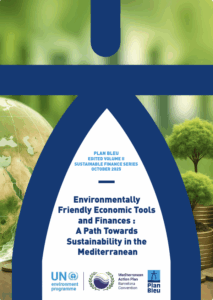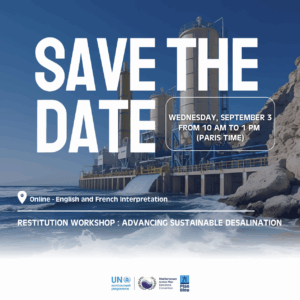ABOUT PLAN BLEU
In 1976, the Mediterranean coastal countries and the European Community adopted the Barcelona Convention to protect the marine environment and its coastal areas. The need to collectively address development and environment in order to build a sustainable future for the Mediterranean is fully integrated by the signatory countries.
Plan Bleu is a French association under the “1901 law” and one of the Regional Activity Centres of the Mediterranean Action Plan (MAP) of the United Nations Environment Programme (UNEP), established by France since 1977. Plan Bleu notably produces:
- thematic studies on various subjects such as aquaculture, desalination, tourism, biodiversity, coastal area sustainability, sustainable finance,
- scenarios for the future to raise awareness among Mediterranean stakeholders and decision-makers on environmental and sustainable development issues in the region,
- and, finally, monitors the state of the environment and development through its regional observatory.
Its intervention framework is provided by the Mediterranean Strategy for Sustainable Development, a regional policy framework to support States in the regional implementation of the 2030 agenda in the Mediterranean.
1.Introduction
Within the framework of its dual function as an observatory for environment and sustainable development and as a center for systemic and prospective analysis, Plan Bleu has had the mission, since its creation in 1977 (mandate renewed in Marrakech in 2009), to provide the Contracting Parties to the Barcelona Convention with data, statistics, and indicators to feed assessments illustrating trends in environment-development relationships in the Mediterranean and to develop future scenarios, enabling them to support their actions and assist the decision-making process. Since 2020, Plan Bleu has managed the Mediterranean regional page of the WESR (World Environmental Situation Room) on behalf of UNEP. This data, information and knowledge platform allows users to access geospatial and statistical data in open access through the MapX tool. The latter is a geospatial data catalog. It functions as an online library of raw and processed data. This tool enables monitoring of the Sustainable Development Goals and illustration of environmental states.
2.Tender Objectives
Today, more than 430 datasets are viewable inMapX and are distributed across 26 distinct thematic categories (“Biodiversity”, “Climate Change”, “Cities”, “Energy”, “Water”, “Tourism”, etc.). These qualitative/quantitative datasets represent multiple variables (environmental parameters, composite indices, sustainable development parameters, etc.) across various time steps (interannual, monthly, etc.) and diverse geographical resolutions (from local to regional scales). In view of its Work Programme (2024-2025), Plan Bleu would like to go further in identifying crosscutting issues and statistical analysis.
Therefore, the main objective of this work is to develop a thematic and statistical matrix analysis framework.. This will involve identifying dependencies between environmental themes and associated datasets at the Mediterranean basin scale, in identifying in Plan Bleu Observatory’s database existing data to chraracterize these corsscutting issues.
The consultant will build a logical framework to conduct matrix analysis (environment and socio-economic activities) adapted to the specificities of the Mediterranean basin. Based on the priority objectives of the Mediterraneéen for Sustainable Development (MSSD). Other themes could be proposed by the consultant. Here are some examples of priority thematic correlation axes for the recruited expert :
- Analysis of correlations between water resources and climate change: Identify relationships between the variability of water resources (e.g.: consecutive dry days, lake volumes) and climatic parameters such as precipitation or temperature.
- Study of links between atmospheric carbon emissions and demographics/transport.
- Exploration of relationships between food security and climatic conditions: Cross-reference food security indices with environmental changes to establish significant regional correlations.
- Spatio-temporal analysis of sustainable development trends:identify temporal evolution patterns of environmental and economic indicators to detect sustainable development trends.
- Assessment of interconnections between hydrographic networks and lacustrine volumes: determine the influences of rivers on lake levels and their hydrological stability in contexts of climate variability.
The expert will rely on the Plan Bleu’s Observatory database to test the proposed hypotheses using simple statistical tests as a first approach.
3.Livrables attendus
| N° Delivrable | Title | Description | Week |
| 1 | Logical framework to conduct matrix analysis | This deliverable presents the design of a structured logical framework for analyzing the correlations between environmental, climatic, and socioeconomic issues in the Mediterranean basin: water resources/climate, carbon emissions/demography, food security/climate conditions, spatio-temporal trends in sustainable development, and hydrographic/lake interconnections. The document establishes the theoretical foundations of the matrix approach adapted to the specific geographical, climatic, and socioeconomic characteristics of the Mediterranean, drawing on an up-to-date scientific state of the art. . Format : an excel table + a word document of 15 pages |
Monday 29/09/2025 |
| 2 | Identification in the Plan Bleu’s Observatory database of data enabling the characterization of inter-relations resulting from deliverable 1 | The expert will rely on the Plan Bleu’s Observatory database to test the proposed hypotheses using simple statistical tests as a first approach.
format: a synthetic note of 10 pages |
Friday 31/10/2025 |
4.Working relationships
The activities covered by this call for tenders will be managed by the Plan Bleu project manager and GIS expert and will be carried out in close collaboration with other Plan Bleu experts (depending on the topics studied), as well as the deputy director and director of Plan Bleu.
5.Allocated budget
For this call for tenders, Plan Bleu has a maximum budget of 1,900.00 including tax. . For all applications, candidates’ financial offers must be in line with this available budget.
6. Required skills
- Solid knowledge of environmental issues and sustainable development in the Mediterranean region;
- Skills in descriptive statistical analysis
- Strong analytical, writing, and synthesis skills;
- Curiosity, rigor, and proactivity;
- Very good levels of English and French expected.
Candidates will be selected on the basis of a letter of interest and a CV accompanied by a financial offer referring to these terms of reference and indicating the consultant’s SIRET number. The evaluation will be based on the principle of the best offer, with 75% of the score based on technical criteria and 25% on financial criteria.
This consultation may be carried out by an individual consultant, a consulting firm, or a consortium of consultants (joint venture).
Candidates are encouraged to send references of previous work on similar topics and to email relevant documents to the address below if they cannot be easily found online.
The final selection of candidates may require an interview. In this case, candidates will be able to participate in a remote interview.
7.Recruitment process
Please send a technical and financial proposal (with CV(s) and cover letter) before August 24, 2025 to the following addresses : [email protected]and[email protected].
Once applications have been received, we will conduct a rigorous evaluation of the technical and financial proposals submitted by the various candidates.












